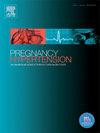Healthcare providers’ knowledge of cardiovascular disease risk after preeclampsia: A pilot of five healthcare facilities in Lusaka, Zambia
IF 2.9
4区 医学
Q2 OBSTETRICS & GYNECOLOGY
Pregnancy Hypertension-An International Journal of Womens Cardiovascular Health
Pub Date : 2024-10-10
DOI:10.1016/j.preghy.2024.101163
引用次数: 0
Abstract
Objective
To assess Healthcare providers (HCPs’) knowledge of cardiovascular disease risk after preeclampsia across five healthcare facilities in Lusaka, Zambia.
Study design
A cross-sectional study was conducted at selected health facilities in Lusaka Zambia from August 5, 2023, to October 31, 2023. A self-administered questionnaire was distributed among obstetricians, general practitioners, registered nurse midwives, registered nurses, enrolled nurses, enrolled midwives, medical licentiates, and registered public health nurses. The knowledge scores were calculated for each participant, and Logistic regression was used to assess the predictors of high knowledge of cardiovascular disease risk after preeclampsia.
Main outcome
The overall mean knowledge score of cardiovascular disease risk after preeclampsia was 4.7/7 (67.1 %). The majority correctly reported hypertension 101 (92.7 %), Ischemic heart disease 84 (77.1 %), Stroke 83 (76.2 %), and kidney disease 75(68.8 %) as future conditions associated with preeclampsia. Knowledge and practice had a significant but moderate negative correlation (r = -0.21, p = 0.037). Compared to obstetricians/general practitioners, registered nurse midwives (adjusted odds ratio [aOR] = 0.21, 95 % CI: 0.05–0.80, p = 0.023) and enrolled midwives/enrolled nurses/medical licentiates/registered public health nurses (aOR = 0.15, 95 % CI: 0.03–0.91, p = 0.039) were less likely to have high knowledge. Additionally, HCPs with 5–10 years (aOR = 7.15, 95 % CI: 1.99–25.72, p = 0.003) and more than 15 years of work experience (aOR = 3.21, 95 % CI: 1.03–9.99, p = 0.017) were more likely to have high knowledge than those with less than five years.
Conclusion
Most HCPs were knowledgeable about the future risk of cardiovascular diseases after preeclampsia. Nevertheless, positive behavioral change interventions may be required to address the disconnect between knowledge and practice.
医疗服务提供者对先兆子痫后心血管疾病风险的认识:赞比亚卢萨卡五家医疗机构的试点项目。
目的:评估赞比亚卢萨卡五家医疗机构的医疗服务提供者(HCPs)对子痫前期后心血管疾病风险的认识:研究设计:研究设计:2023 年 8 月 5 日至 2023 年 10 月 31 日,在赞比亚卢萨卡选定的医疗机构开展了一项横断面研究。研究人员向产科医生、全科医生、注册助产士、注册护士、注册护士、注册助产士、执业医师和注册公共卫生护士发放了自填问卷。计算每位参与者的知识得分,并采用 Logistic 回归评估子痫前期后心血管疾病风险高知识的预测因素:子痫前期心血管疾病风险知识的总平均得分为 4.7/7(67.1%)。大多数人正确报告了与子痫前期相关的未来疾病:高血压 101 例(92.7%)、缺血性心脏病 84 例(77.1%)、中风 83 例(76.2%)和肾病 75 例(68.8%)。知识与实践之间存在明显的中度负相关(r = -0.21,p = 0.037)。与产科医生/全科医生相比,注册助产士(调整后的几率比 [aOR] = 0.21,95 % CI:0.05-0.80,p = 0.023)和注册助产士/注册护士/执业医师/注册公共卫生护士(aOR = 0.15,95 % CI:0.03-0.91,p = 0.039)的知识水平较低。此外,工作年限在 5-10 年(aOR = 7.15,95 % CI:1.99-25.72,p = 0.003)和 15 年以上(aOR = 3.21,95 % CI:1.03-9.99,p = 0.017)的初级保健人员比工作年限少于 5 年的初级保健人员更有可能具有较高的知识水平:大多数保健医生对先兆子痫后心血管疾病的未来风险有所了解。结论:大多数保健医生对先兆子痫后心血管疾病的未来风险有所了解,但可能需要采取积极的行为改变干预措施,以解决知识与实践脱节的问题。
本文章由计算机程序翻译,如有差异,请以英文原文为准。
求助全文
约1分钟内获得全文
求助全文
来源期刊

Pregnancy Hypertension-An International Journal of Womens Cardiovascular Health
OBSTETRICS & GYNECOLOGYPERIPHERAL VASCULAR-PERIPHERAL VASCULAR DISEASE
CiteScore
4.90
自引率
0.00%
发文量
127
期刊介绍:
Pregnancy Hypertension: An International Journal of Women''s Cardiovascular Health aims to stimulate research in the field of hypertension in pregnancy, disseminate the useful results of such research, and advance education in the field.
We publish articles pertaining to human and animal blood pressure during gestation, hypertension during gestation including physiology of circulatory control, pathophysiology, methodology, therapy or any other material relevant to the relationship between elevated blood pressure and pregnancy. The subtitle reflects the wider aspects of studying hypertension in pregnancy thus we also publish articles on in utero programming, nutrition, long term effects of hypertension in pregnancy on cardiovascular health and other research that helps our understanding of the etiology or consequences of hypertension in pregnancy. Case reports are not published unless of exceptional/outstanding importance to the field.
 求助内容:
求助内容: 应助结果提醒方式:
应助结果提醒方式:


